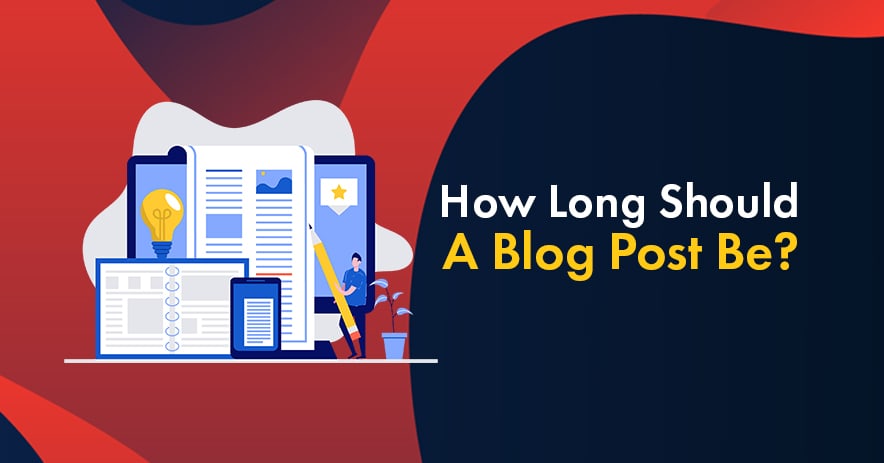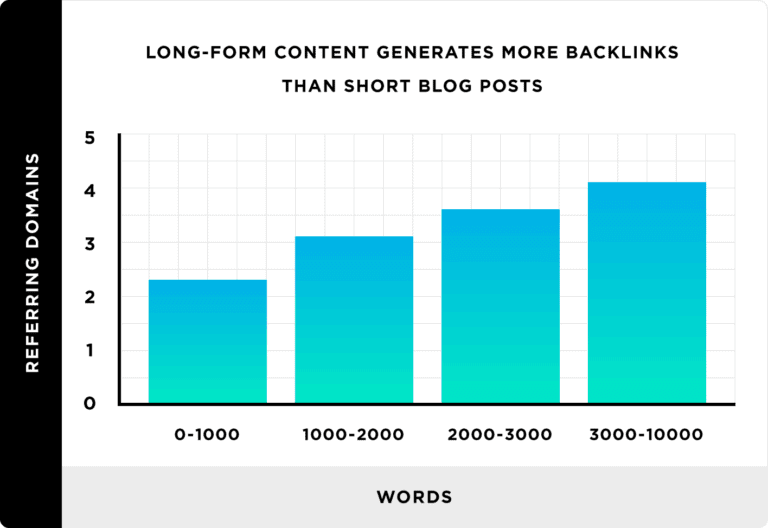
One of the most asked questions in the blogging world is “How long should a blog post be?”.
No matter what niche you’re in, it’s important to know the ideal blog post length.
Why? Knowing your ideal blog post length helps you cover your topic in depth without boring your audience.
That being said you don’t need to look at the word count every time you write.
Here’s a rule of thumb: cover a topic in detail without the fluff and you’ll get amazing results from SEO.
When creating content, the #1 most important thing is to write QUALITY content that is helpful to your readers. As long as your content is useful and relevant to the topic, you can write as much as you can.
If you’re looking for an informative case study on how long should a blog post be, this guide is just for you where you’ll learn;
- The truth about long-form content (with data)
- Proven ways to find your ideal blog post length for SEO
- With lots of real-life examples and more
By the end of this article, you’ll be well on your way to finding the PERFECT length for your blog posts and creating epic blog posts that will keep your audience coming back for more.
So are you ready? Let’s get started.
Ideal Blog Post Length: The Simple Guide for Beginners on How Long Should A Blog Post Be
Is it true that long-form articles rank well on Google?
Before we jump into the details, let’s talk about the importance of long-form articles.
Many surveys reveal that certain lengths tend to perform better than others.
For example, blog posts between 1000 and 2000 words tend to generate the most social media shares (Source: Backlinko)

According to Backlinko’s research (Brian Dean from Backlinko analyzed over 912 million blog posts), blog posts between 3,000 and 10,000 words tend to generate more backlinks than short blog posts.

See that? Longer articles tend to get more search traffic and backlinks whereas shorter content with around 1000 words tends to generate more social media engagement.
The optimal number of words for a blog post to rank well is around 3000 to 10,000 words.
So if there’s any doubt whether long-form articles work or not, don’t worry. They definitely do!
Not only do long-form articles help improve your SEO, but they also help build trust and credibility with your audience.
The BEST part about long-form articles is that they perform well both in search engines and social media.
That being said, there’s still no magic number to the perfect blog post length.
With a little effort and errors, you can definitely find the RIGHT spot that will help you create PERFECT blog posts for your audience.
3 Tips to Find the RIGHT Length For Your Blog Articles
Use the following THREE methods to find your ideal blog post length.
1. Know your topic
Obviously, the length of your blog posts depends on the topic you pick.
First, think about what you’re trying to achieve with your blog post.
Are you sharing a personal story, writing a review, or teaching your readers something new?
The length of your post should be directly proportional to the type of content you create. It’s as simple as that.
There are a few types of blog posts that require a longer format which include;
- Product reviews
- Case studies
- In-depth comparisons
- Expert interviews
- Ultimate guides, etc
For example, if you’re writing a case study about a product, you’ll need to include all the information about those products including its benefits, alternatives, how to use the product, customer ratings, pricing, etc.
Here’s an example case study on MrBeast net worth;

It took a TON of time for us to create the above case study and the word count of this post is 3000 words.
It is one of the high-competitive keywords and we’re currently ranking #5 on Google search for the keyword (which is ultimately bringing us more search traffic).
So… certain content types often require a detailed explanation to perform well in search engines.
Ultimately, the best way to determine the length of your blog post is to write until you’ve said everything you need to say.
Then, edit your blog post ruthlessly and remove all the unwanted words that don’t add value to your content. That’s how you can be sure that your blog post is the perfect length for your topic.
2. Research your competitors
The best way to find your ideal blog post length is to research your competitors’ content.
Ask yourself the following questions;
- How long are their posts?
- What topics are they covering?
- What writing tone are they using?
Once you get answers to these questions, it becomes easier for you to understand what is already working WELL in your niche.
If your competitors are already ranking on the first page of Google with shorter articles, you too can follow the same approach.
There’s no need to create a 5000-word article if the average word count of the top 10 ranking posts for a topic is around 2000 words.
Are you getting it?
Similarly, if your competitors are mostly writing long-form articles to rank higher on Google, then you might want to spend more time on research to create informative and in-depth articles.
That being, there’s no rule for what works best, so it’s ALWAYS important to experiment until you find an ideal blog post length that works for you and your audience.
3. Experiment, experiment, and experiment!
Sometimes, even a 1000-word article can bring you MASSIVE traffic to your blog.
Other times, a 3000 or 5000-word article will do the trick.
One of our high-traffic posts is around “best Indian blogs” and the word count for the post is around 4500 words. It’s currently ranking in first or second position on Google.

Few of our other posts rank well with even fewer words.
The key here is to try and experiment.
Don’t be afraid to experiment with your blog posts.
Try writing a few different lengths of posts and see what works best for you and your audience.
With trial and error, you’ll find the ideal blog post length for your content needs.
Here’s the thing you need to remember;
- Shorter articles are ALWAYS easier to read and more likely to hold readers’ attention
- Longer articles are helpful if you want to teach your audience something
If you’re not sure which blog post length will work best for you, try experimenting. Write a few short articles and see how they work. Publish a couple of 3000-word articles and analyze your traffic and social shares.
Make sure to vary the length of each blog post to find out your ideal article length.
You can also ask your readers or fellow bloggers to read each blog post and give their honest feedback. By experimenting with blog post length, you can find the sweet spot that will keep readers engaged from start to finish.
So don’t be afraid to try something new with your blog posts – you may be surprised at the results.
What’s our take on ideal blog post length?
There is no easy answer to how long should a blog post be.
The best length for a blog post will vary from topic to topic.
If you are writing about a topic that requires a lot of explanation, a longer post is what you need. Similarly, if your topic is simple and requires a concise explanation, a shorter post may be more appropriate.
The bottom line? There is no magic number when it comes to blog post length. It depends on your blog post’s topic and what you want to convey to your audience.
That being said, make sure to research the top 10 ranking articles for your topic and use your best judgment to create content effectively.
A 6-point QUICK checklist to find your ideal blog post length

Although there is no perfect blog post length as every blog and every audience is different.
If you’re still struggling to find the right length for your blog posts, here’s a quick checklist you can use to find an ideal length for your blog posts.
- Try to write blog posts with at least 1000 words. This is a good general rule of thumb to follow if you want to get more search traffic and social media engagement.
- Make sure your posts are scannable. No one likes a long and boring article. It’s your job to make your posts easy to scan. Use subheadings, bullet points, and short paragraphs to break up your text and make it easier to read.
- Pay attention to engagement metrics. If you see that people are responding well to detailed blog posts, then stick with that length. If you see that they’re engaging with short posts, stick with short articles.
- Experiment until you find the sweet spot. Ultimately, the best way to find what works is to try different things and see what length gets you the best results.
- Research your competitor’s content. Analyze their top-performing posts using tools like Semrush. Find their average blog post’s length. If something’s already working well for your competitors, it may work well for you too.
- Finally, make sure your blog post is long enough to cover the topic thoroughly, but not so long that it gets harder for your readers to read and digest.
FAQs | Blog Post Length
Here are some of the frequently asked questions about blog post length.
What is the ideal blog post length for SEO?
According to many surveys, the ideal blog post length for SEO is between 2,100 to 2,400 words.
What is the ideal blog post title length?
Google typically displays the first 50 to 60 characters of a title tag. So the ideal blog post title length should be below 60 characters.
How many words should a blog post be?
If you want more social engagement, aim at publishing 1000 to 1500 word blog posts. If you want better SEO results, target 2000 to 4000-word blog posts.
Do longer blog posts rank well?
Google NEVER specifies the ideal word length for blog posts or web pages. There are no rules. But in general, longer blog posts add value to the readers as they cover in-depth information. So they tend to rank well. If your long blog posts are fluff, they’ll NOT rank!
What should a blog post include?
An informative blog post should include the following;
– A captivating headline
– Engaging introduction
– Multiple subheadings
– Lots of appealing images
– Internal links and call to actions
– Conclusion
Related Posts:
Final thoughts on blog post length
Although there’s no rule on how long a blog post should be, as a rule of thumb, aim for around 1000-1500 words. Gone are the days when you can publish crappy 300-word articles to get first-page rankings on Google.
Your content must be useful and thorough enough to convey your explanation.
So what do you think about the ideal blog post length? What’s your average word count while creating an article? Let us know your thoughts in the comments.








